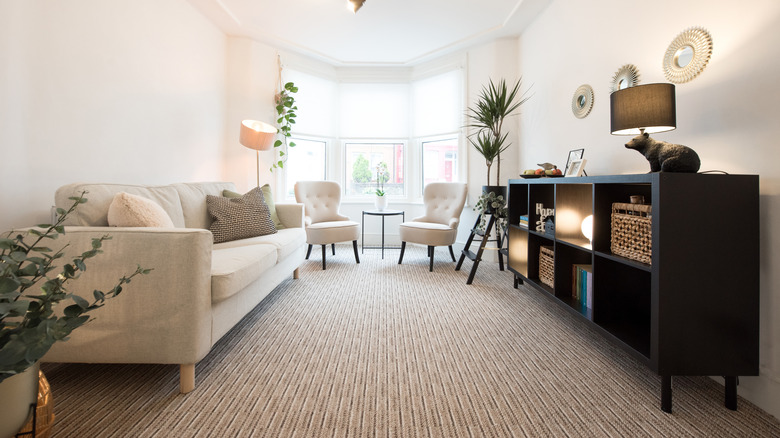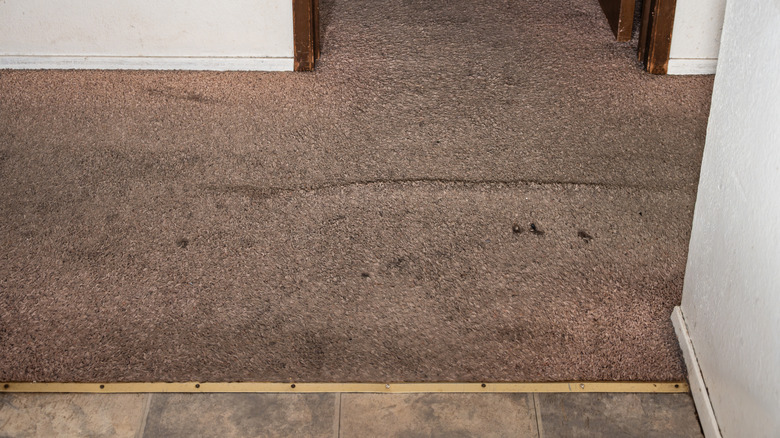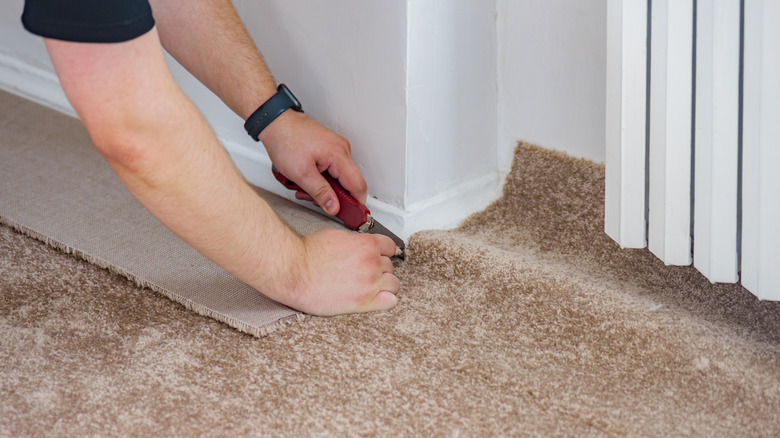The Long-Term Effects Of Carpet Flooring On Home Resale Value
Homeowners may have more freedom to renovate than renters, but there's still a good reason to second-guess which design options are worth it: the ever-present question of resale value. Flooring changes are a particularly big deal since they have such a big impact and can be pricey for potential buyers to re-do. So, does carpeting hurt your home's value or boost it? It depends on the type of carpet. According to real estate expert Ryan Fitzgerald, buyers do tend to prefer hardwood over carpet floors overall, and the return on investment (ROI) of carpet is pretty modest compared to hardwood, even in the best-case scenario. But the exact effect on resale value is not just about whether or not there's carpet in a house, but also about what the carpet looks like.
For example, is it an impeccably clean, neutral-colored, cozy carpet in a bedroom? That could be a bonus that adds value. "Although buyers tend to pick hardwood floors because of their longevity and ease of maintenance, many people can still be drawn to well-maintained and well-placed carpets in a home," Fitzgerald exclusively told House Digest. If, on the other hand, a carpet is quite worn, stained, or discolored, that can "majorly off putting to potential buyers," Fitzgerald added. So if you want to maximize a carpet's value, stay vigilant about maintenance and stain prevention.
Location, color, and material also matter
The location of the carpet also plays a big role in how it affects resale value, in part because it can increase the odds that the carpet is in poorer condition (or will be at some point). "Buyers may find carpets in high-moisture spaces, like bathrooms or basements, very unappealing because of maintenance and mold concerns," Ryan Fitzgerald exclusively told House Digest. Similarly, carpets in areas that receive a lot of foot traffic, like hallways, are more susceptible to stains and will require more maintenance to avoid tanking the home's resale value. "In my experience, you're far better off reserving carpet floors for a select few areas of your home where comfort is prioritized, like bedrooms," Fitzgerald said.
He also advised choosing a more neutral color and style if resale value is a concern. "In terms of style and color choices, and generally speaking, as it does come down to an individual's personal taste, neutral tones tend to be more appealing, whilst bolder colors and designs could limit a carpet's appeal and not match with a potential homebuyer's taste," Fitzgerald explained. Colors and patterns are also to blame for certain types of carpeted living rooms looking terribly outdated. Lastly, as is often the case with renovations, higher-quality materials such as wool may be more appealing to buyers than less expensive synthetics — but that's not necessarily true not for all buyers. According to Fitzgerald, some will actually prefer a synthetic carpet, like nylon, since it's easier to maintain than wool and durable.
The bottom line
Although it's possible for carpet flooring to increase a home's resale value, it's probably not enough of a reason to add carpeting if you don't already have it. In the best-case scenario, carpet floors only offer a return on investment (ROI) of 20% to 40%, according to Fitzgerald. In comparison, other flooring options, like hardwood, can yield a ROI as high as 70 to 80%. "Unfortunately, when it comes to resale value, the drawbacks exceed the advantages," Fitzgerald told House Digest exclusively. If, however, you want carpet for other reasons beyond resale value, it may still be the best flooring option for you if it fits with your needs and lifestyle. One benefit of carpet is that it's inexpensive to install compared to tile or hardwood, Fitzgerald said. It's possible to DIY with the right tools on hand, too.
"Another attraction may be its coziness and warmth, particularly in colder climates," he added. "Families with small children or elderly people especially value the cushioning it provides because it creates a softer and safer surface. Carpets are also better at absorbing sound, which can help lower noise levels between floors in homes with multiple stories." One compromise to enjoy some of the perks of carpet without affecting resale value may be to opt for a large area rug.


